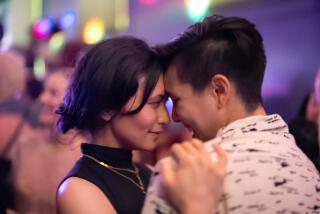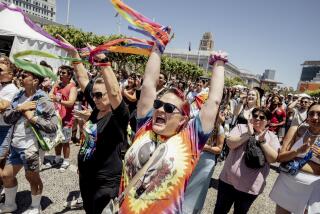Commentary : Gay Pride Festivities an Antidote
- Share via
While the demonstrations for individual freedom in China and parts of the Soviet Union are receiving worldwide attention and sympathy, an equally dramatic revolution is taking place in our own back yard.
After centuries of condemnation and oppression, homosexual people are demanding and gradually gaining some status as equal citizens. Openly gay men and lesbians are achieving public office and are being recognized for their accomplishments in business, the arts and professions, and in all aspects of life.
This weekend, San Diego is celebrating that acceptance with the 15th annual Gay Pride Parade and Festival.
But, like other civic celebrations, the Gay Pride festival also commemorates an important historical event: the “Stonewall Uprising” in New York in June, 1969.
Before Stonewall, police routinely--and with impunity--harassed gay men and lesbians by raiding gay gathering places and bars and carting the patrons off to jail on minor or spurious charges. The result was lost jobs and ruined lives.
But at 3 a.m. on June 28, 1969, when nine New York City police officers burst into the Stonewall Inn, a private, after-hours club in Greenwich Village, the patrons of the bar fought back. Others from outside the bar joined in, and the quickly outnumbered police were put on the defensive. For two days and nights, street battles between reinforced police units and an ever-growing number of outraged men and women continued. Then the police called for a truce and retreated.
The result was an improvement in police-community relations, not just for the gay community but for all Americans who have suffered from police misconduct.
Although many brave gay men and women had been struggling to gain equal treatment for years, the “Stonewall Uprising” emboldened others to join in the movement to gain social and legal equality. This movement grew to be a national one, and, five years after the New York City incidents, the first “Gay Pride” march was organized in San Diego.
Although the first marches were sometimes defiant gestures, they soon developed into joyous expressions of self-liberation, self-acceptance and pride. They celebrate the many contributions from the gay culture that have become interwoven into the fabric of everyday life. The parades have also become a major incentive for gay people to “come out of the closet.”
Each year, the San Diego parade has grown and draws more non-gay supporting participants, including public officials and other dignitaries. A festival was added in the third year.
The two-day celebration is a major means of educating both the gay/lesbian community and the general community about age-old misperceptions, misunderstandings and prejudices regarding homosexuality.
In this year when Americans are celebrating the bicentennial of the signing of the Constitution, there is another important message in the Gay Pride celebration: the Bill of Rights guarantees equality to all. There are no exceptions based upon race, religion, national or ethnic origin, age, sex, sexual orientation, or any other human condition or description.
In an era when such groups as neo-Nazis, skinheads, the Ku Klux Klan, and extremist hatemongers on both the right and the left try to deprive others of their rights, Gay Pride events serve as a demonstration that violence, intimidation and prejudice will not prevail.
This country was founded on the ideal of tolerance, an ideal that is inspiring the struggle for freedom in faraway China and among our gay and lesbian fellow citizens. The Gay Pride Parade on Saturday and the festival today are celebrations of self-esteem and self-respect in the same way that Martin Luther King Jr.’s birthday, Labor Day, Cinco de Mayo, and St. Patrick’s Day observances engender feelings of self-worth among blacks, laborers and people of Mexican and Irish descent.
Such observances serve as an antidote to the divisive forces that cause much of the violence and social problems in today’s world. San Diegans of good will and patriotic community spirit are encouraged to understand and to teach their children the importance of all these celebrations of our diversity.
More to Read
Sign up for Essential California
The most important California stories and recommendations in your inbox every morning.
You may occasionally receive promotional content from the Los Angeles Times.













